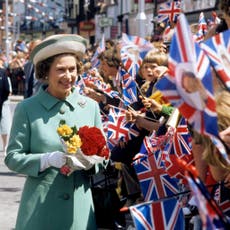I grew old alongside the Queen
I was seven years behind her but I felt like we lived our lives in parallel

Your support helps us to tell the story
My recent work focusing on Latino voters in Arizona has shown me how crucial independent journalism is in giving voice to underrepresented communities.
Your support is what allows us to tell these stories, bringing attention to the issues that are often overlooked. Without your contributions, these voices might not be heard.
Every dollar you give helps us continue to shine a light on these critical issues in the run up to the election and beyond

Eric Garcia
Washington Bureau Chief
I shadowed the Queen all my life. I was seven years behind her, with nothing in common but that of being a woman going through the different human ages. We aged in parallel, if not in unison.
I first saw royalty when King George and Princess Elizabeth drove through Hazel Grove, the area of Stockport where I grew up, on their triumphal post-war tour. They both had bright orange faces, and I was shocked that a man, even a King, should wear make-up. Elizabeth and her sister Margaret were icons for growing little girls. They had pretty frocks and dogs and ponies. We of course didn’t. Envy loomed.
When Elizabeth got married in 1947 I developed a crush. I cut out all the blurry black-and-white newsprint pictures of her wedding dress and read all about the (to us) lavish celebrations.
By the time I went to Cambridge in the early 1950s I had gone off the monarchy altogether. What was the point? Didn’t they cost money and live in idleness? But the King’s death and Elizabeth’s accession was proclaimed by heralds on the Senate House steps, and we all flocked to see that. After all, it was history. But when eager reporters besieged Cambridge looking for what they called “the new Elizabethans”, we pooh-poohed the idea.
The coronation came a year later, in 1953. I boycotted it. That is to say, I had better things to do than join a crowded common room in Newnham College craning my neck to see a small black-and-white television screen. Nonetheless, I rejoiced that we had a woman as monarch and went out for a drink at The Eagle in celebration.
From then on, the Queen was simply there. It is impossible to exaggerate how totally glamorous she was in post-war Britain. A tiny waist, lavish swirling skirts. She had poise too. Her voice sounded distant, formal, stilted. But it was the Queen’s English. Why else had I been sent to elocutions lessons if not to sound a little like her?
Down the years she was utterly consistent, upright, dutiful. Her Christmas Day broadcast ceased to be the not-to-miss occasion it once was, but she remained the star performer, instinctively knowing that the woman she was merged imperceptibly into the figurehead. There was no separating the one from the other.
When out and about on duty we never saw her sneeze, blow her nose, scratch an itch, ease a tight shoe, adjust her dress, drop a handkerchief, stroke her hair. She could stand for hours taking a salute without flinching or fidgeting. She seemed always to move at the same pace, and the world moved round her at the speed she set.
Through the decades she resisted fashion trends and high style. Her most daring concession was a skirt above the knee some time in the 1960s. The press and other women noticed immediately. From then on she was traditional without being frumpy, classic without being routine. Her interactions with people were consistently low-key – a modest acknowledgement, with no trace of familiarity. She began to smile more as she grew older.
I saw her in the House of Lords giving the speech from the throne at the opening of parliament. She never fluffed her lines or moved an inch out of position. She bore her weighty crown and long elaborate robes with a seeming ease. It was a feat even more impressive as she got older and must have been longing to put her feet up with her dogs and the racing papers. It was an immaculate performance.
Baroness Bakewell is a broadcaster, writer and Labour peer



Join our commenting forum
Join thought-provoking conversations, follow other Independent readers and see their replies
Comments